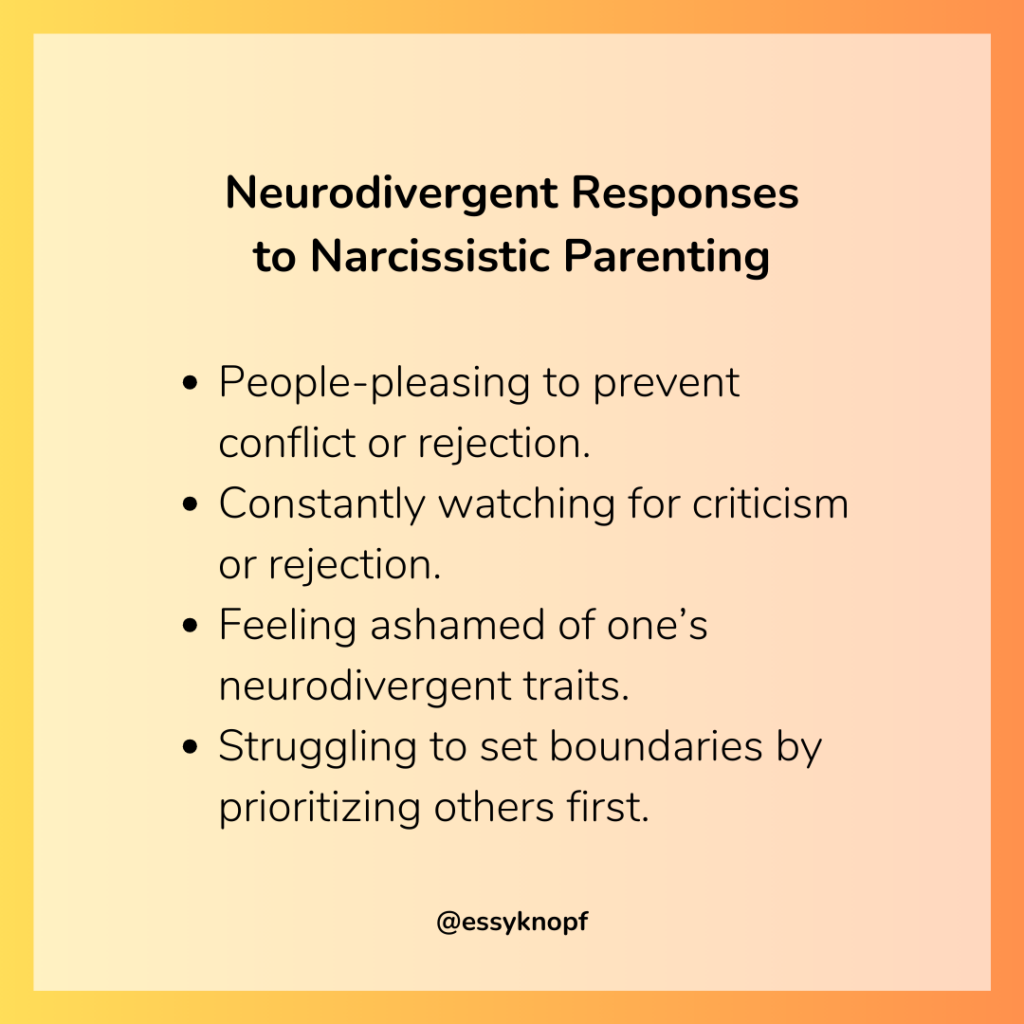The hidden trauma: Neurodivergent kids of narcissistic parents
Autistics and ADHDers already navigate a world that often misunderstands them. But when neurodivergent (ND) children grow up with narcissistic parents, the challenges multiply, leaving deep psychological scars. These children are frequently forced into roles that serve their narcissistic parents’ emotional needs, rather than being nurtured for who they truly are.
Many ND adults recall childhoods where their narcissistic parents invalidated their feelings, used guilt and shame as control tactics, or even manipulated them into believing their needs were selfish. This complex form of emotional abuse can lead to long-term struggles with self-worth, codependency, and people-pleasing tendencies.
Why Narcissistic Parents Struggle with Neurodivergent Children
Narcissistic parents thrive on control, validation, and maintaining an idealized self-image. A child who is “different”—who stims, who hyper-focuses on niche interests, who struggles with social norms—may threaten that image. Rather than seeking to understand their child’s neurodivergence, narcissistic parents may:
- Gaslight their child, dismissing their needs and emotions as invalid.
- Use their child as a source of narcissistic supply, demanding excessive admiration or compliance.
- Force masking, expecting their child to hide their ND traits to avoid embarrassment.
- Play the victim, making the child feel responsible for their parent’s emotional well-being.
This creates a confusing environment where ND children feel unseen, misunderstood, and constantly at fault for simply existing as they are.
The Long-Term Impact on Neurodivergent Adults
Children raised in these environments often develop harmful coping mechanisms, including:
- People-pleasing behaviors to avoid conflict or abandonment.
- Hyper-vigilance, always anticipating criticism or rejection.
- Internalized shame, believing their ND traits make them unworthy.
- Difficulty setting boundaries, due to being conditioned to prioritize others’ needs over their own.
Many ND adults struggle with identity confusion because they spent years suppressing their true selves in order to survive. Having been raised by narcissistic parents, they may also unconsciously seek out similar relationships in adulthood, repeating harmful patterns of emotional dependence and validation-seeking.

Healing and Reclaiming Your Authentic Self
Breaking free from the cycle of narcissistic parents’ control starts with recognizing the patterns and rebuilding self-trust. Here’s how:
- Acknowledge the Trauma: Your experiences were real and valid. Understanding that your struggles stem from your environment, not personal failure, is the first step to healing.
- Reclaim Your Autistic or ADHDer Identity: Embrace your ND traits as strengths, not weaknesses. Unlearning internalized ableism allows you to appreciate your authentic self.
- Set Boundaries: If your narcissistic parents continue to manipulate or disrespect you, establishing clear limits is crucial. You have the right to protect your emotional well-being.
- Find a Neuroaffirming Community: Seek out spaces where your neurodivergence is celebrated, not shamed. Connecting with others who understand your experiences can be incredibly validating.
- Consider Therapy: Working with a neuroaffirming therapist can help unpack childhood conditioning, build self-worth, and develop healthier relationship patterns.
- Challenge Internalized Beliefs: Many ND adults raised by narcissistic parents struggle with deep-seated beliefs that they are inherently flawed. Recognizing these thought patterns and replacing them with affirming self-talk is essential to rebuilding self-esteem.
You Are Not Alone
If you grew up with narcissistic parents, know that your worth is not determined by how well you met someone else’s expectations. Your neurodivergence is not a flaw, but a unique and valuable way of experiencing the world.
Healing takes time, but reclaiming your authenticity is worth it. You deserve to be seen, heard, and accepted—exactly as you are.

Essy Knopf is a therapist who likes to explore what it means to be neurodivergent and queer. Subscribe to get all new posts sent directly to your inbox.
© 2025 Ehsan "Essy" Knopf. Any views or opinions represented in this blog are personal and belong solely to the blog owner and do not represent those of people, institutions or organizations that the owner may or may not be associated with in professional or personal capacity, unless explicitly stated. All content found on the EssyKnopf.com website and affiliated social media accounts were created for informational purposes only and should not be treated as a substitute for the advice of qualified medical or mental health professionals. Always follow the advice of your designated provider.


